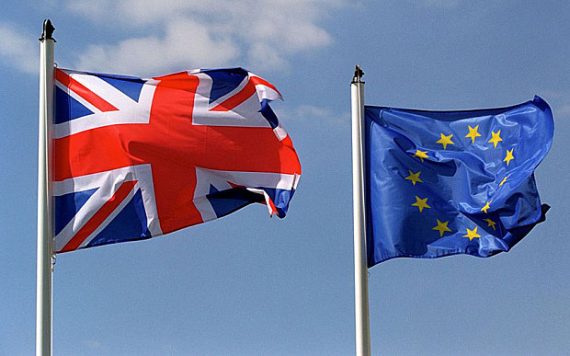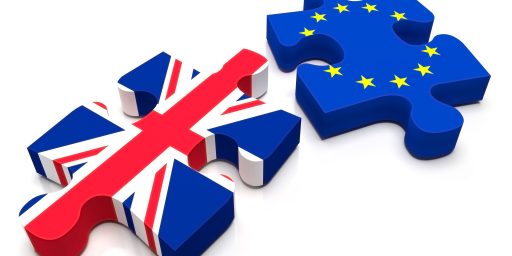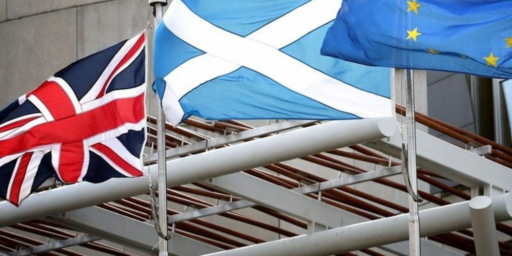‘Leave’ Takes The Lead In Latest ‘Brexit’ Polling
With just over a week to go, the latest polling shows voters in the United Kingdom leaning toward leaving the European Union.
It’s just over a week before the United Kingdom votes on the historic referendum that will decide whether the nation leaves the European Union, and a pair of polls from The Guardian show “Leave” taking a fairly significant lead:
Support for leaving the EU is strengthening, with phone and online surveys reporting a six-point lead, according to a pair of Guardian/ICM polls.
Leave now enjoys a 53%-47% advantage once “don’t knows” are excluded, according to research conducted over the weekend, compared with a 52%-48% split reported by ICM a fortnight ago.
The figures will make grim reading for David Cameron, George Osborne and the Labour party. They follow a fortnight in which immigration became the dominant issue in the referendum campaign, with the publication of official figures showing that net migration had risen to a near-record 333,000 in 2015.
Prof John Curtice of Strathclyde University, who analyses available referendum polling data on his website whatukthinks.org, noted that after the ICM data, the running average “poll of polls” would stand at 52% for leave and 48% for remain, the first time leave has been in such a strong position.
“These results are consistent with the generality of numbers over the last couple of weeks, in which there has been some weakening in the remain position,” he said. “It was already plain that this race was far closer than the prime minister intended and he must now be feeling discomfort at the thought that the outcome really could be in doubt.”
Throughout the long campaign, internet surveys have pointed to a close race. But the remain camp had been able to take heart from more traditional telephone polls, which have tended to show them enjoying a double-digit lead.
That appears to have changed recently. Two weeks ago, ICM reported for the first time that leave had taken the lead in one of its phone polls.
Under the surface, the proportion of voters who remain undecided is dwindling, in possible evidence of the hardening of attitudes towards EU membership.
In ICM’s telephone fieldwork in particular, 13% of respondents were indicating uncertainty about how they would vote a fortnight ago, but that figure has now fallen to 6%. Online, 7% say they don’t know, down from 9% two weeks ago.
There are also signs that Conservative infighting, which has characterised the referendum campaign, is now hurting the party in the Westminster stakes. The Tories are down two points on the month in the long-running Guardian/ICM telephone poll series, at 34%, only one point ahead of Jeremy Corbyn’s Labour party, which gains one on the month to reach 33%.
However, the referendum is not producing a sustained Ukip surge: Nigel Farage’s party sinks by one point from the previous poll, to 14%. The Liberal Democrats climb two to 9% and the Greens also pick up two, reaching 5%. The Scottish National party and Plaid Cymru remain on 4% and 1% respectively. Other minor parties are unchanged at 1%.
(…)
Breaking down the population between generations confirms that Eurosceptism sets in with age: among the young, aged 18 to 34, the balance is 56% to 39% for remain, whereas pensioners of 65 and over lean the other way, by 55% to 39%.
Voters in professional “AB” grade occupations are strongly in favour of staying in Europe (57%-38%), whereas skilled manual workers (C2s) are plumping for leave by an emphatic 67% to 29% margin.
Subsequent polling has closed the gap between “Remain” and “Leave” to some extent so that the aforementioned Poll of Polls now shows “Leave” leading by just a narrow 51%, but the momentum in the polling over the past two weeks seems to be clearly in favor of those who would leave the European Union and have the United Kingdom go on its own. It’s worth remembering, of course, the experience from both the Scottish Independence Referendum in 2014 and the General Election of 2015 in which polling seemed to underestimate support for remaining in the United Kingdom in Scotland and in favor of the Conservative Party prior to those election. If that is indicative of ongoing issues with pollsters in the U.K., then these numbers may not be necessarily be reliable. The fact that Conservatives and the Labour Party alike both seem to be rather nervous about the outcome of next week’s referendum, though, is a fairly good indication that they’ve also gotten inside information that gives them reason to be concerned that the vote could result in the British public sending the message that they want to cut the nation off from Europe in a rather emphatic way.
A victory for the “Leave” forces, of course, could have significant consequences both for the United Kingdom and for the rest of Europe. With respect to the U.K., several analysts have suggested that a victory by the “Leave” forces could give renewed impetus to the independence forces in Scotland, where support for the E.U. is rather high, and that it could even stoke a desire for independence from Northern Ireland and Wales, In that case, we’d be looking at an historic break-up of the U.K. and a reversal of more than 1,000 years of history. Outside the U.K., a ‘Brexit’ victory could provide impetus for similar moves in other parts of Europe eager to free themselves from the bureaucratic control of Brussels and the economic impact of switching to the Euro. There would likely still be some rump form of a united Europe that would remain, consisting primarily of Germany and France, but it would be a shadow of its former self and the economic advantages created by the free movement of people and goods would largely disappear.
In any case, it will all come down to the vote on June 23rd, when the British people will have the opportunity to make history in their hands.





It’s a non-binding referendum. Brexit would have to make it through Parliament in order to go into effect, and that ain’t gonna happen.
@Pch101:
So which slogan do you prefer?
“The EU: We don’t need your stinking Democracy”
or
“The EU: Shut up and let your betters handle things”
Mike
I believe that in the event of Brexit that Scottish independence is a near-certainty, and sooner rather than later. Given the choice of being ruled from Brussels or London, the Scots will choose the former. They’ve seen the many advantages they’ve had from being part of the EU and know what they stand to lose.
how can you blame them, it’s not like the latin-based parts are doing their part to be solvent. sure, that’ll leave germany to start another reich but hey, at least we have nato!
@MBunge:
I tried to run your comment through Google Translate, but gibberish isn’t one of the language choices.
Things fall apart; the centre cannot hold;
Mere anarchy is loosed upon the world,
The blood-dimmed tide is loosed, and everywhere
The ceremony of innocence is drowned;
The best lack all conviction, while the worst
Are full of passionate intensity.
– W. B. Yeats
Scotland, Northern Ireland, and Wales may want out of Great Britain if they do the Brexit. That’s the problem with secession. Where does it stop? West Virginia seceded from Virginia and the Confederacy. East Tennessee likely wanted to, as would the Free State of Jones and a number of other areas. I expect chunks of Kentucky and Maryland would have liked to secede from the Union. Do we finally fragment into state size countries? Counties? Townships? Lawns?
If you watch BBC Question Time when Nigel Farage is one of the panelists, you can easily see that even a buffoon like Farage can sound reasonable arguing against the EU. You can argue, for instance, that the EU forces Britain to take White Immigrants for Eastern Europe instead of immigrants from the former colonies and that is racist. There are homosexual activists that don´t like being in the same league with openly homophobic governments in Eastern Europe. That became clear when it was argued that Brussels did not allow Britain to enact tariffs against imported steel when the last steel mill in the country was threatened to close.
I like to joke that the EU gave Angela Merkel what Wilhelm II and Adolf Hitler tried to get waging two World Wars(And that even Otto Von Bismarck did not want that).
For free, in a silverplate.
I suspect that this will end like the Scottish vote, with the late deciders breaking decisively for staying. There really is no compelling reason for going, and lots of reasons to stay.
@gVOR08:
That poem is going around in my head a lot lately.
I’m honestly not sure where I stand on Brexit. If I were British I’d have a big problem with Brussels taking a significant role in my life. But I don’t like the general direction. Eastern Europe is turning to the right, sometimes the far right. Greece may be as well. Israel is veering ever further right.
NATO has very significant strains – Turkey being the most obvious. I’m not sure how we can have that government in NATO, but NATO without Turkey loses a whole lot of useful territory.
The world economy is far from healthy, China may be slipping more seriously than we yet realize, the much-touted BRICS are not exactly impressive, we’re barely growing. And the world’s only Superpower is within 5% points of electing a toddler in the body of a vile old man.
The center may not hold. Heavy times.
@stonetools:
I think this is an identity vote for the English as opposed to the Scots or Welsh. The English have an established ethnography and geography in their heads – people from the North is like this, Essex people are like that, the Welsh are these kinds of people – and now that familiar set-up is being challenged by Poles, Pakistanis, Saudis, etc… The impression one gets walking around London is that it is effortlessly multicultural, multiethnic and multiconfessional. But I’m just a tourist and Brits don’t always show their hands.
@Pch101:
Well, it wasn’t entirely clear if you thought an elected government acting expressly contrary to the demonstrated will of the people was a good thing or not? If a majority of the British public votes to leave the EU and the British government essentially says “Nah, we don’t be doing that,” that strikes me as something that could be just as damaging as Brexit itself is supposed to be.
Mike
Demographically OAPs (Pensioners) are the most likely to vote in UK elections and the poorly educated the least likely to vote; these are the two core constituencies of Brexit support.
The Minor parties/affiliations of the hard-right and radical left also support Brexit (along with Putin & Trump allegedly!), whilst just about all economists, financial experts and most large organisations favour the status quo. I suspect I will be heading off next Thursday to nullify 50% of my parents votes as I prefer the current touchy-feely, socially tolerant, easy going, multicultural country of today to the more navel gazing, sexist, racist, homophobic era I was brought up in the 1970s. Britain was the “sick man of Europe” until it joined the European Union, now it has all of the benefits of the EU whilst retaining our own currency – that’s enough for me.
@MBunge:
You ought to type “non-binding referendum” into a search engine.
You might want to also look up “supermajority” while you’re at it.
@Pch101:
You might want to look up concepts like “credibility” and “democratic legitimacy” and “consent of the governed.”
I mean, I believe the superdelegates in the Democratic Party would be entirely within their rights to throw their support to Bernie Sanders, handing him the nomination. How do you think that would work out?
Think before you post.
Mike
@MBunge:
Good advice. When are you going to begin to follow it?
Add “representative democracy” to your list of the many things that you don’t understand and should learn about.
Breakup of the EMU will mean a net economic benefit and strengthening of democratic institutions. Brussels’ unaccountable technocracy is hopelessly incompetent and corrupt.
@Ben Wolf:
Are you referring to the European monetary union to which the UK does not belong?
@MBunge:
You don’t need to believe it, you can accept it as a hard fact based on the current rules of the Democratic Party (which changes it rules after a convention (IIRC) instead of just before as the other party does). But hypotheticals are better examples when they have some likelyhood of happening.
@michael reynolds:
Turkey is one of the best assets of NATO. They have control over the Bosporus, the only access that Russia has to the Mediterranean.Besides that, remember that the Cuban Missile Crisis started because the United States could nuke Russia from Turkey.
If Turkey decides to close the Bosporus and if Britain, Norway and Finland closes the North Sea, Russia is completely a landlocked country.
@Ben Wolf: Last week there was a major conference in Dresden, Germany. The people who attended ranged from Henry Kissinger to Lindsay Graham.
Major decisions were made there, yet I saw nothing on the news networks about it.
See: Dresden conference
@MBunge: You can’t reason with a person suffering from an aggressive personality disorder. My advice is to simply ignore her.
@stonetools: European leadership has intentionally sustained a six-year long economic and political crisis. No good reason exists to remain affiliated with such an organization.
@Rafer Janders: one of the supposed reasons the Independence movement finally fizzled in Quebec. The Thousand Nations told everyone in no uncertain terms that if Quebec decided to secede, the Thousand Nations would do the same, seceding from Quebec the day after.
…and guess where the hydroelectric power plant servicing Montreal is located….?
@Andre Kenji:
No, you’re forgetting about Russia’s ports in the East, such as Vladivostok. There may also be some “cold water” ports that are available.
@Ratufa: Vladivostok is snowlocked for about four months each year, is located very far from Russian population centers and could be blocked from Japan or South Korea.
The UK is not a member of the Eurozone, so the Brits should take a stand and withdraw from the Eurozone to which they do not belong. Yeah, that’s a sensible argument.
What’s even better is that the driving force for anti-EU sentiment in the UK is coming from the hard right, such as the xenophobic UKIP that links withdrawal from the EU with keeping immigrants out. (Go Google “rivers of blood” if you wish to understand this mentality.) It’s nice that we have some misguided American progressives who wish to be associated with the policies of such people.
What they don’t seem to realize is that it would be quite possible to withdraw from the EU while still participating in trade agreements that won’t stem the flow of immigration. Yes, they are about as smart as your typical Trump supporter, i.e. not very.
@Pch101: There’s got to be some legal effects of not being in the EU, no?
My feeling is that if the Brits really do pull out, we’re going to see London lose its status as one of the financial capitals of the world.
Maybe the people egging this all on have shorted the U.K. equivalent of REITs in the London property market? /end{tongue-in-cheek}
@grumpy realist:
The odds of Brexit becoming reality are about zero. It would have to be approved by Parliament, and it is opposed by Labour, the Lib Dems and the Greens as well as a lot of Conservatives, so it won’t get the votes.
But even if the UK did exit the EU, it would probably follow an alternative path as have the Norwegians with its membership in the EEA, which would leave the UK largely in the same situation as it is now. The likelihood of the UK becoming a Fortress Britannia with zero participation in the European trade and regulatory scheme is nil. (And in that scenario, it would be comical to see the reaction of the UKIP and BNP bigots once they realize that the Poles were still showing up to work even after Britain’s glorious exit from the EU.)
As noted, the UK is not part of the Eurozone, so there’s not much of a comparison to Grexit. Britain is determined to maintain the pound and its own central bank (as I think that it should), so none of that is going to change irrespective of whether it belongs to the EU.
@MBunge:
See? Why waste time with someone that can’t be bothered to read the entire post and so doesn’t even understand the context?
Speaking of context, it might be wise to figure out that Brexit is the love child of Mother England reactionaries and bigots. (Of course, you might have to actually know something about the outside world to realize what is driving is.)
It might also be wise to figure out is that a union of Europe’s major powers helps to keep the place from going to war and blowing itself up every several decades as it has otherwise been inclined to do.
But no, it’s much better to whine about the EU, confuse it with the Eurozone, and ignore both the history and current political context than to know what it is that you’re talking about.